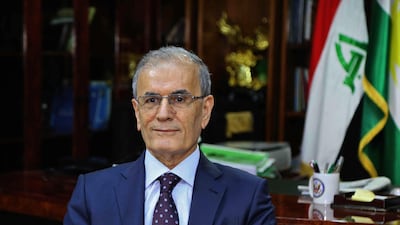The president of Iraqi Kurdistan declared ties between Baghdad and Erbil severed on Thursday after Iraq's parliament sacked the governor of Kirkuk amid tensions over a Kurdish independence referendum.
"The escalation in the Iraqi parliament has left no room for negotiations with Baghdad," Masoud Barzani said.
The vote to dismiss Najmadin Karim, the Kurdish governor of oil-rich Kirkuk — claimed by both Baghdad and the semi-autonomous Kurdistan region — follows a decision by the province to take part in the referendum scheduled on September 25 that is opposed by Baghdad.
The lawmakers were acting on a request on Thursday from prime minister Haider Al Abadi’s office "for a vote to dismiss the governor of Kirkuk”, said parliament spokesman Abdel Al Malik Hussieni.
“The request is based on the second clause of section 8 of Article 7 of the ‘Law of governorates not incorporated into a region’, the document is a product of Iraq’s local governance programme,” Mr Al Hussieni said.
Article 7 of the provincial law stipulates that the “council of representatives may remove the governor by the absolute majority of its members upon the proposal of the prime minister, if he lost integrity, abused his powers, wasted public funds, lost a condition of membership, negligence or intentional shortcomings in performing his duties”.
Mr Karim has been a vocal supporter of Kurdistan’s independence and of Kirkuk's participation in the vote.
The province, which is home to Iraqi Arabs, Turkmen, Christians and Kurds, announced in August that it would participate in Iraqi Kurdistan's independence referendum even though it is not part of the Kurdistan region.
The president of the European Turkmen Association League, Sundus Saqi told The National that "the league welcomes this decision. Although it is late, the decision is just."
Ms Saqi said that “Kirkuk is part of Iraq and is governed from Baghdad. However, the Kurds and their governor Najmadin Karim, have been acting like it is a part of Kurdistan’s autonomous region.”
“Requesting for provinces in Iraq, out of the Kurdish region, to participate in the Kurdish province’s independence referendum is illegal," Ms Saqi said, and would "lead to a civil war”.
The best solution to end the dispute over the territory of Kirkuk is an “equal partnership of the three communities Turkmens, Arabs and Kurds”, she said.
Earlier, the Patriotic Union of Kurdistan (PUK) party denounced the Iraqi parliament's sacking of Mr Karim, saying the “government wants to give a political punishment to the Kurdistan Region. The removal of Kirkuk’s governor has no reasonable explanation.”
The parliament voted on Tuesday to reject the Kurdish referendum and authorised Mr Al Abadi to “take all measures” to preserve national unity.
Meanwhile, Turkmen and Arab leaders in Kirkuk have filed formal petitions to the United Nations and international embassies declaring their opposition to the inclusion of Kirkuk in the Kurdish referendum.
Arshad Al Salehi, an Iraqi MP and head of the Iraqi Turkmen Front said that a signed petition by the Turkmen Front in Kirkuk was sent to the United Nations as well as embassies in the region on Wednesday.
"We directed our objections to international organisations because what is happening in Kirkuk is unconstitutional and is illegal," Mr Al Salehi told The National.
The non-binding referendum has faced strong opposition from central government in Baghdad as well as from Turkey, Iran and the United States. On Thursday, Turkey warned Kurdish leaders that the referendum would "have a cost".
Tehran and Ankara both fear that the vote will ignite separatist aspirations among their own sizeable Kurdish minorities, while Washington has warned Erbil that the vote would distract from Iraq’s battle against ISIL.
Mr Barzani held talks on the referendum on Thursday with the US envoy to the anti-ISIL campaign, Brett McGurk, US ambassador Douglas Silliman, British ambassador Frank Baker and Jan Kubis, the UN special representative and head of its assistance mission in Iraq.


